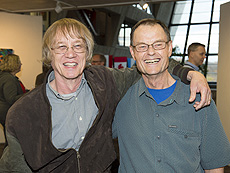Scientists Roger Dixon and Erik Ramberg receive 2014 Director's Award
 |
| Accelerator Division scientists Roger Dixon and Erik Ramberg were recognized by Director Nigel Lockyer last week for their contributions to the Saturday Morning Physics program at Fermilab. Photo: Reidar Hahn |
At the annual education volunteers reception on Oct. 20, Fermilab Director Nigel Lockyer presented Fermilab physicists Roger Dixon and Erik Ramberg with the Director's Award for their more than 15 years of running Fermilab's Saturday Morning Physics education program.
Lockyer praised Dixon and Ramberg's decades of commitment to teaching physics to thousands of high school students.
"Roger's love of educating the next generation and giving them his best enhances the lab's reputation in education and science research," Lockyer said. He added, "Erik's recent work with the sustainability initiative, resulting in the installation of a solar energy panel outside the Lederman Center, is an example of his focus on educating the next generation."
Dixon and Ramberg both said their love of volunteering has been unabated since assuming the Saturday Morning Physics leadership from the program's founders, former Fermilab director Leon Lederman and former Fermilab physicist Drasko Jovanovic, early advocates for education at the laboratory. They also said that similar programs all over the world have been modeled on Fermilab's Saturday Morning Physics.
"I was invited to give a lecture in Darmstadt, Germany, where they were celebrating their 10th anniversary of Saturday Morning Physics, which was inspired by our program," Dixon said. "This was an incredibly rewarding experience."
Ramberg expressed similar enthusiasm for science education.
"The Saturday Morning Physics caters to very dedicated students who use their Saturdays to come and study physics," Ramberg said. "Those kinds of dedicated students are exactly what we need in science. Science is a long haul, and it is important to be encouraged at the beginning to make that long haul."
Lockyer also recognized the work of eight other Fermilab volunteers who contribute to K-12 education programs at the lab, including the IMSA Student Research and Inquiry Program, visitor and student tours, and Saturday Morning Physics. They were Maurice Ball, AD: Brendan Kiburg, PPD; Jamieson Olsen, PPD; Bill Lee, ND; Mandy Rominsky, PPD; Jin-Yuan Wu, PPD; Jyotsna Osta, ND; Marc Weinberg, Florida State University.
Fermilab Education Program Leader Spencer Pasero said how much he appreciated all Fermilab's education volunteers.
"This year we had 264 people at Fermilab volunteer for programs in one way or another, which is just a great number," he told the crowd. "The teachers and kids tell us over and over again that what makes coming here special is meeting you guys."
This is the first time the selection committee chose two winners for the Director's Award, which is funded by Fermilab Friends for Science Education.
"You ask anybody at Fermilab to help with a tour with visitors or with Saturday Morning Physics or give a lecture, they always step forward," Lockyer said at the reception after handing out the awards. "I think that is just the desire of scientists in general to teach and to share what they are learning with everyone else. You see it in spades at Fermilab."
—Rich Blaustein
|